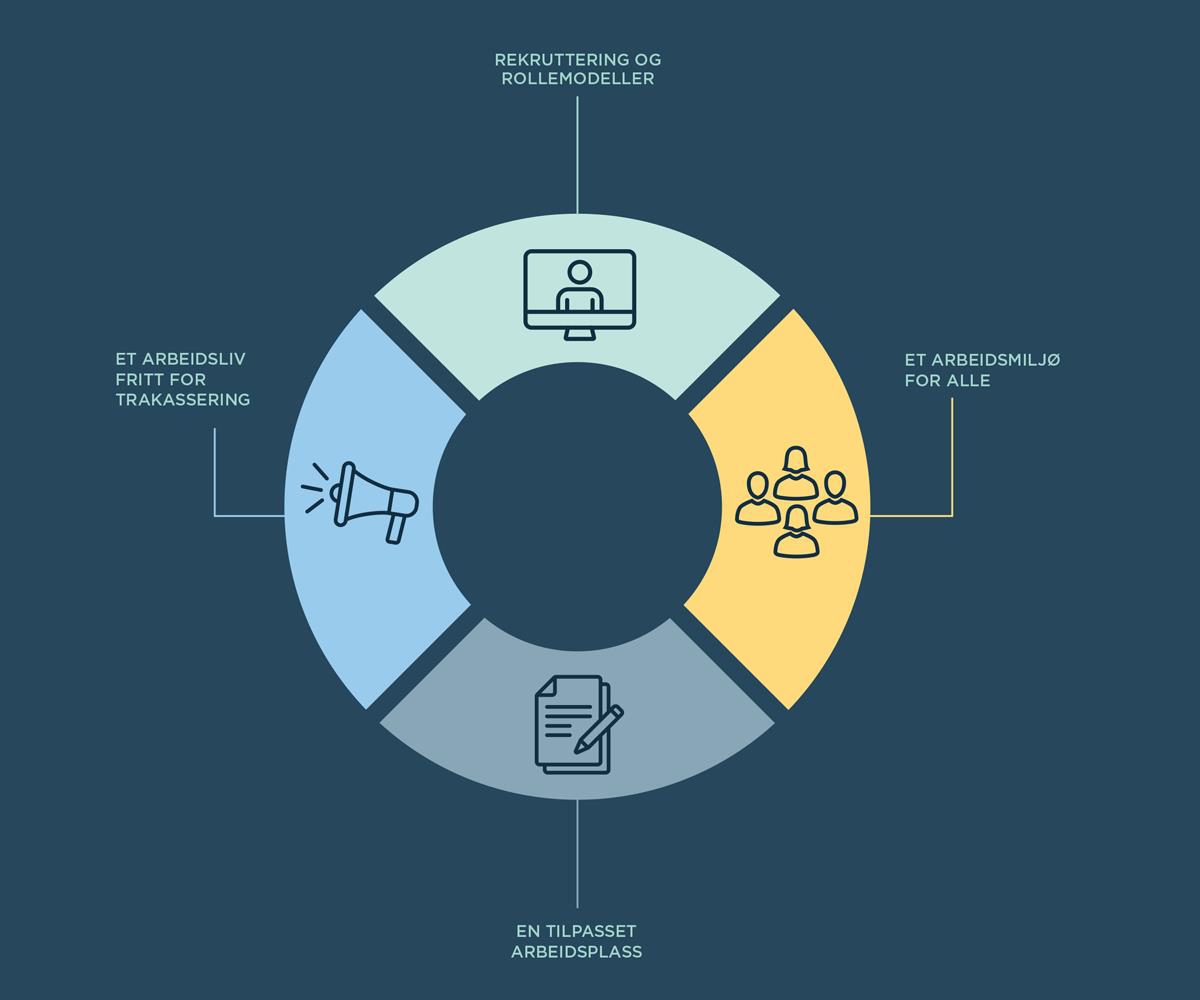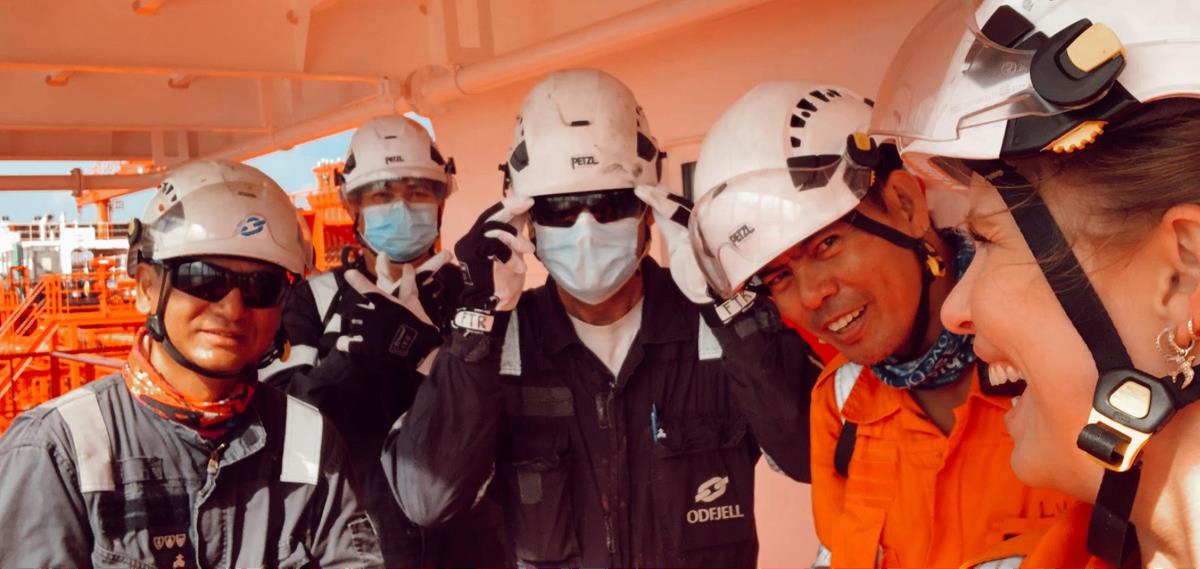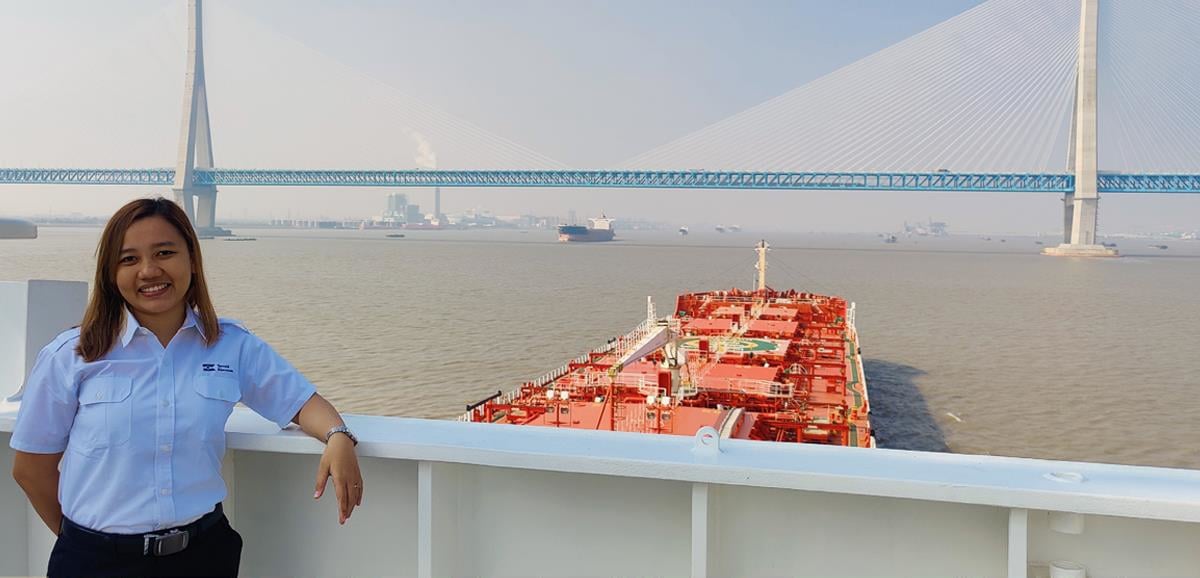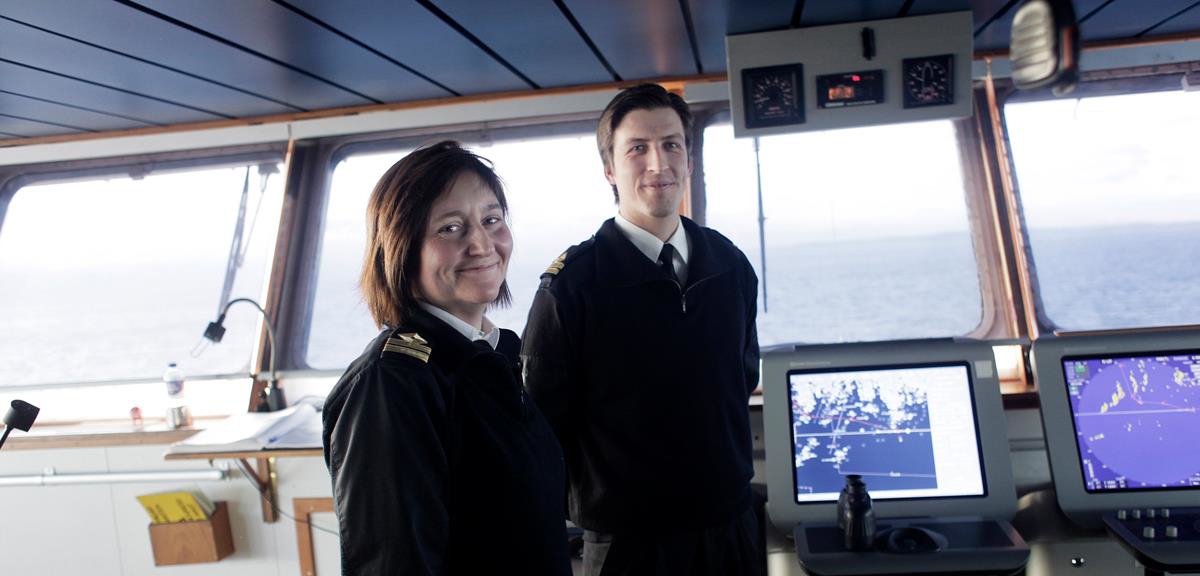5 Focus areas

The reasons for why few women choose a maritime career path are many and complex. There are many factors that influence the level of gender equality in the industry, and especially at sea. Working with these factors requires active, structured, and targeted efforts over time. The Norwegian Government wants a strengthened tripartite cooperation that is closer, more binding and more strategic to support greater gender equality and diversity in the maritime industry.
Gender equality is both important in itself and good commercial policy. The Norwegian Government is pursuing a proactive gender equality policy which is intended to ensure that everyone is included in society, irrespective of gender, sexual orientation, functional ability, and ethnicity. Targeted efforts must be made to increase diversity in the labour market and improve gender representation in gender-segregated industries, including the maritime industry. Increased gender equality and diversity may contribute to enhancing the reputation of the maritime industry.
In the Norwegian Government’s view increased gender equality and diversity in the business sector can, in the long run, result in more innovation, a better working environment, better decisions and value creation. To continue the ability of the Norwegian maritime industry to create value and innovate, it is vital that the industry is able to recruit and employ talent from the entire workforce. In other words, gender equality and diversity are crucial for the maritime industry to attract the labour that is necessary and to maintain its competitive advantage in the face of changes in the market and society.
To address the challenges described in Chapter 4, the Norwegian Government has identified four focus areas: recruitment and role models, a working environment that benefits everyone, a working life free from harassment and an adapted workplace. The focus areas described in this chapter require efforts from companies in the maritime industry, employee and employer organisations and government authorities. The Norwegian Government will take the initiative to draft a declaration of cooperation with the industry that targets the four focus areas.
- The Norwegian Government will take the initiative to draft a declaration of cooperation with the industry to work towards gender equality in the maritime sector, and to document future development concerning gender equality in the sector. The declaration should include objectives and a timeline and shall be prepared in cooperation with the parties to the declataration and the Norwegian Ministry of Culture and Equality.
Recruitment and role models
Moving into the future the maritime industry will experience a green and digital transition. Access to a competent workforce will be important to the competitiveness of both the Norwegian fleet and the maritime industry in general. Girls and young women who have chosen maritime education programmes and occupations can be good role models and ambassadors for the maritime industry. There is much to indicate that it is hugely significant to see that others have made choices that do not conform with gender norms. The Norwegian Government will contribute towards more girls becoming aware of and applying for maritime education programmes and maritime occupations.
The Norwegian Government will:
- Initiate dialogue with the maritime educational institutions concerning how to increase recruitment from all genders.
- Initiate information campaigns relating to career opportunities in the maritime sector that are targeted at girls of lower secondary school age.
A working environment that benefits everyone
For the maritime industry to be an attractive workplace, it is crucial that the workplace is seen as inclusive. The Norwegian Government will contribute to focusing on the importance of diversity and gender equality in all maritime policymaking. For an international industry that recruits from large parts of the world, successful gender equality work requires that measures are not only implemented in Norway, but that relevant international forums are used to promote this work. The Norwegian Government will therefore use relevant international arenas to promote diversity and gender equality in the maritime industry.

It is important that the workplace is seen as safe and inclusive for all. Source: Odfjell
The Norwegian Government will:
- Include a diversity and gender equality perspective in all maritime policymaking.
- Use international arenas, such as the IMO and ILO, to promote gender equality and diversity in the maritime sector.
- Incorporate diversity and gender equality into the Norwegian mandate for the work on the revision of the International Convention on Standards of Training, Certification and Watchkeeping for Seafarers (STCW) in the IMO.
- Update descriptions for the courses that the Norwegian Maritime Authority prepares in cooperation with the maritime industry to ensure that gender-neutral terms are used.
- Update the wording of Norwegian maritime legislation to ensure that gender-neutral terms are used.
- Strengthen the Norwegian Maritime Authority’s information work on gender equality vis-à-vis the industry and employees.
A working life free from harassment
Harassment, including sexual harassment, is prohibited, cf. the Equality and Anti-Discrimination Act (Section 13). A work life free from harassment is the responsibility of everyone. Managers in a workplace, in an organisation and in an educational institution have an obligation to work actively to prevent harassment.

Norwegian shipping companies operate in all parts of the world.
Source: Torvald Klaveness
The Government will ratify ILO Convention No. 190 on the Elimination of Violence and Harassment in the World of Work, cf. Proposition 48 LS (2022–2023), which was presented on 3 March 2023. Norway has an extensive system of rules that are intended to ensure that employees are protected against violence and harassment in their work life. The Convention is not considered to require amendments to Norwegian law. However, the Norwegian Government still wishes to pursue a proactive gender equality policy and is focussed on women and men having the same rights. No one shall be subjected to violence and harassment at work. In connection with the ratification of the ILO Convention, the Norwegian Government has proposed: to specify that the protection against harassment in the Working Environment Act also entails protection against sexual harassment, to include definitions of harassment and sexual harassment in the Working Environment Act, and to specify the duties of safety representatives when concerning the psychosocial working environment. To ensure that seafarers enjoy the same protection against harassment as employees onshore there will be an assessment of whether amendments must be made to Norwegian maritime legislation. Furthermore, it is important that the Norwegian Maritime Authority’s supervisory activities are organised in a manner that makes it possible for the Authority’s inspectors to detect situations such as harassment.
The Norwegian Government will:
- Ratify ILO Convention No. 190.
- Present a report to the Norwegian Parliament (white paper) on sexual harassment in 2024.
- Consider amendments to Norwegian maritime legislation to highlight and strengthen efforts to combat harassment.
- Strengthen the Norwegian Maritime Authority’s supervisory role in connection with harassment.
An adapted workplace

Seafarers on the bridge. Source: Tri Dinh / Norsk Sjømannsforbund
Working conditions and terms of employment are key factors for an industry to be considered attractive. The starting point and framework for active gender equality work in working life have been established through important legislative work. 2020 saw the introduction of an enhanced activity duty and duty to issue a statement in the Equality and Anti-Discrimination Act. The activity duty and duty to issue a statement constitute an obligation for all employers to work actively for equality and non-discrimination and must as a minimum cover the areas of recruitment, pay and working conditions, promotion and development opportunities, adaptation, and the opportunity to combine work and family life.
More flexible solutions for maternity and parental leave can contribute to more women remaining in the maritime industry. Similarly, the well-facilitated physical organisation of the workplace may contribute to it being perceived as inclusive. The Norwegian Government will assess the need for potential amendments to the Ship Labour Act and the Ship Safety and Security Act and associated regulations which can contribute towards promoting gender equality.
The Norwegian Government will:
- Assess the need for amendments to Norwegian maritime legislation to promote gender equality.
- Make amendments to the Equality and Anti-Discrimination Act to highlight that employees who are covered by the Ship Labour Act have the same protection under the Act as employees who have an employment relationship pursuant to the Working Environment Act.